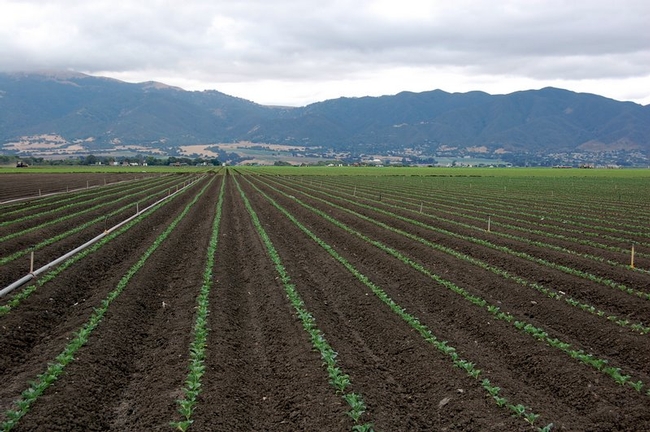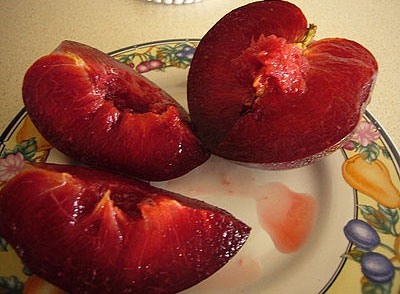Posts Tagged: breeding
Researchers identify genes making strawberries resistant to Fusarium wilt
Resistant varieties to be released later this year to growers
Strawberry losses from Fusarium wilt could become less of a threat after researchers at the University of California, Davis, discovered genes that are resistant to the deadly soilborne disease.
The findings, published in the journal Theoretical and Applied Genetics, are the culmination of several years' work, and the discovery will help protect against disease losses, said Steve Knapp, director of the Strawberry Breeding Program at the college.
“What we've accomplished here is important and it's valuable for the industry and it's going to protect growers,” Knapp said.
Strawberries are a key crop in California, where about 1.8 billion pounds of the nutritious fruit are grown each year, making up roughly 88% of what is harvested in the United States.
Finding the genes could prevent a Fusarium wilt pandemic.
“The disease has started to appear more often up and down the state,” said Glenn Cole, a breeder and field manager with the Strawberry Breeding Program. “Once the wilt gets in, the plant just crashes. You have total die out.”
Searching for resistance
UC Davis scientists screened thousands of strawberry plants in the college nursery and took DNA samples. They then used genetic screening and developed DNA diagnostics to identify genes that are resistant to the primary race of Fusarium wilt.
“The genes have been floating around in the strawberry germplasm for thousands of years,” Cole said, but no one worked to identify them.
This latest development brings “strawberry into the 21st century in terms of solving this problem,” Knapp said.
Protecting future crops
This work means breeders can introduce the resistant gene into future strawberry varieties. This fall the program will release new cultivars that have the Fusarium wilt resistance gene. And the DNA diagnostic tools will help breeders respond to new Fusarium wilt variants that develop.
“There will be new threats and we want to be prepared for them,” Knapp said. “We want to understand how this works in strawberries so that as new threats emerge, we can address them as rapidly as possible.”
“If you don't have fusarium resistance, you're done,” Cole said. “The disease could be around more than you think.”
Fusarium wilt hasn't traditionally been an issue but when the fumigant methyl bromide was phased out in 2005, things changed. The disease was in the soil and without the fumigant, instances of wilt increased, especially in areas where crops weren't rotated.
Breeding new varieties
Knapp and Cole have informed the industry about current strawberry varieties that have the resistance so they can select plants with that added protection. The new resistant varieties coming out later this year will be suitable for several growing seasons.
“It's a big deal,” Cole said. “Everything is incremental in plant breeding, but it's a big deal.”
Plant scientists have been breeding strawberries at UC Davis since the 1930s and they have released more than 60 patented varieties through the public breeding program.
All of the work happened at UC Davis. Dominique Pincot, Mitchell Feldmann, Mishi Vachev, Marta Bjornson, Alan Rodriguez, Randi Famula and Gitta Coaker from the Department of Plant Sciences, and Thomas Gordon from the Department of Plant Pathology contributed to the research, as did Michael Hardigan and Peter Henry who are now at the U.S. Department of Agriculture Agricultural Research Service and Nicholas Cobo who is at University of La Frontera in Chile.
The research was funded by UC Davis and grants from the USDA National Institute of Food and Agriculture Specialty Crop Research Initiative.
UC Davis to lead $15 million research into climate-change resistant wheat
The project will also train plant breeders for the future
Wheat products account for roughly 20% of what people eat every day around the globe. As climate changes, wheat crops must adapt to new weather patterns to keep up with demand.
The University of California, Davis, is leading a five-year, $15 million research project to accelerate wheat breeding to meet those new climate realities, as well as to train a new generation of plant breeders.
“Everything is less stable,” said Jorge Dubcovsky, a plant sciences distinguished professor who is leading the grant research. “Everything is changing so you need to be fast. You need to be able to adapt fast.”
The grant from the U.S. Department of Agriculture's National Institute of Food and Agriculture will create a coordinated consortium of 41 wheat breeders and researchers from 22 institutions in 20 states. Researchers from Mexico and the United Kingdom are also participating.
Breeding needs to speed up
“Breeding crops for the future will require new traits, breeding platforms built for quick transfer of traits to elite cultivars, coordination of breeding efforts in public and private domains, and training for current and future plant breeders and researchers,” NIFA said in an announcement about this grant and others related to breeding.
The program involves on-the-ground research, identifying molecular markers and data analysis from multiple institutions to determine genes that will help wheat crops mitigate the effects of climate change. Plant breeding will follow to prove out those findings.
Wheat is unlike other crops in that 60% of the plant varieties — generating about $4 billion in annual production — are developed by public breeding programs rather than private corporations. In many states, wheat growers tax themselves to support basic breeding efforts at public institutions like UC Davis.
Increased coordinated research
The NIFA grant money will lead to more coordinated, sophisticated research. “This grant allows us to do breeding at a level that a good, modern company would do,” Dubcovsky said. “This grant is essential to maintain modern and effective public breeding programs in the U.S.”
The consortium will bring together data and research from across institutions, allowing for more expansive analysis while reducing redundancies. “We can take advantage of the data from everybody,” he said. “By doing that we don't need to duplicate efforts.”
A team in Texas will analyze plant images taken from drones at each institution to extract information about plant growth, water use, nitrogen levels and other data. “Using technology, we can see beyond our human capabilities,” Dubcovsky said. “You can extract a huge amount of information from every plant variety.”
The data from those images will allow researchers to document the plants throughout the life cycle and determine which plants fare better under certain conditions. Genotyping will help researchers obtain information about the plant genome. The combination of these two types of data could speed up breeding cycles, helping wheat crops adapt to a changing environment.
“If we can breed fast, we can adapt to change,” Dubcovsky said. “We are trying to make sustainable improvements in time.”
Training the next generation
The project will also train a cohort of 20 plant Ph.D. students in active breeding programs where they will participate in fieldwork, collect data from drones and DNA samples, and learn to integrate that information to accelerate wheat breeding. The students will participate in online and face-to-face workshops, as well as educational events and national scientific conferences.
Colorado State University, Cornell University, Kansas State University, Michigan State University, Montana State University, Oklahoma State University, Purdue University, South Dakota State University, Texas A&M University, University of Idaho, University of Illinois, University of Minnesota, University of Nebraska, University of Wisconsin, Utah State University, Virginia Tech, Washington State University, and U.S. Department of Agriculture Agricultural Research Service branches in North Dakota, Washington, Kansas and North Carolina are also participating in the consortium.
Nothing common about these beans
As you're ladling up country-style pinto beans for your weekend barbecue or fixing a cold three-bean salad from kidney, string and navy beans for a summer picnic, pause to remember what a long and storied history these “common bean” varieties share and the new scientific advances that promise to boost their productivity worldwide.
This week, a new genome sequencing is being reported for the common bean, which ranks as the world's 10th most widely grown food crop and includes the culinary favorites above, whose varieties together comprise a $1.2 billion crop in the United States.
“The availability of this new whole-genome sequence for beans is already paying off,” said Paul Gepts, professor in the Department of Plant Sciences at UC Davis and co-author of the new sequencing study.
Gepts, who leads the bean-breeding program at UC Davis, notes that the new sequence is being used to confirm many of the findings made earlier by his UC Davis research group, including identification of the common bean's two points of origin and domestication.
Sequencing and bean ancestry
The common bean is thought to have originated in Mexico more than 100,000 years ago, but -- as the Gepts group earlier discovered – was domesticated separately at two different geographic locations in Mesoamerica and the southern Andes.
“This finding makes the common bean an unusually interesting experimental system because the domestication process has been replicated in this crop,” Gepts said.
The sequencing team compared gene sequences from pooled populations of plants representing these two regions and found that only a small fraction of the genes are shared between common bean species from the two locations. This supports the earlier finding that the common bean was domesticated in two separate events -- one at each location -- but distinct genes were involved in each event.
The new whole-genome sequencing is also helping to identify genetic “markers” that can be used to speed up breeding of new and more productive bean varieties in the United States, East Africa and elsewhere, Gepts said.
The nitrogen connection
All of bean varieties that belong to the “common bean” group share with the closely related soybean the highly valued ability to form symbiotic relationships with “nitrogen-fixing” bacteria in the soil.
The plants and the bacteria work together to convert nitrogen in the atmosphere into ammonia – which includes nitrogen in a form that enriches the soil and feeds crops. Nitrogen-fixing crop plants can actually reduce or eliminate the need for farmers to apply expensive fertilizers.
One goal of the new sequencing project was to better understand the genetic basis for how such symbiotic relationships between nitrogen-fixing plants and bacteria are formed and sustained, with an eye toward increasing fuel- and food-crop productivity.
The research team successfully identified a handful of genes involved with moving nitrogen around, which could be helpful to farmers who intercrop beans with other crops that don't fix nitrogen.
Findings from this study are reported this week online in the journal Nature Genetics. The sequencing project was led by researchers at the University of Georgia, U.S. Department of Energy Joint Genome Institute, Hudson Alpha Institute for Biotechnology and North Dakota State University.
UC Davis plant breeding: nurturing a rare breed
While working in Tanzania on community development projects several years ago, Iago Lowe came to a life-changing conclusion:
Food security is central to projects that make a lasting difference in people's well-being. It ensures that communities have the seeds, soil, water and environment to produce enough to eat.
However, his bachelor's degree in physics and religion from Dartmouth College did not adequately prepare him to spearhead those kinds of projects.
To address that gap in his ability to "make some small difference in the world," Lowe started doctoral studies at UC Davis in 2007 in plant breeding and genetics.
"There are so many needs in developing nations — for schools, roads, water, other infrastructure — but when the money and people leave, so often the projects die," said Lowe, who completed his Ph.D. in Plant Breeding and Genetics at UC Davis in 2011. "The few projects I saw that continued to thrive, that really made a tangible difference in people's lives, almost always dealt with local food security, seed systems, soil and water conservation and ecological restoration — projects that demanded a set of skills I didn't have. After studying plant breeding at UC Davis and that's no longer the case."
Lowe exemplifies a new breed of plant breeders at UC Davis. Long a global leader in plant breeding, UC Davis has been retooling its programs — offering new training, creating new curriculum, hiring new faculty (as the budget allows) and conducting world-class research to meet a growing demand for new crops and for breeders.
The new generation of scientists that those programs will produce — and their research breakthroughs — can't come soon enough for industry, government and philanthropic foundation leaders who say that a shortage of plant breeders is hampering efforts to alleviate hunger around the world. Hundreds of high-paying industry jobs for plant breeders are going unfilled.
“Plant breeding is such a vital tool for helping us deal with significant challenges in the 21st century such as food security, population increase, urbanization, and water and energy shortages," said Xingping Zhang, a watermelon breeder with the Davis-based seed company Syngenta. "Who is going to educate the plant breeders? UC Davis is in a perfect position to do so because it's a great center of science and technological inventions, located right in the heart of agricultural abundance. No place in the world offers the diversity of crops [like those] grown in California."
In another major nod to UC Davis expertise, the U.S. Department of Agriculture awarded $40 million in grants earlier in 2011 to develop climate-change-tolerant plants and new bioenergy sources. UC Davis scientists will lead two research teams from more than 50 universities in more than 20 states.
"Each of these projects features transdisciplinary, regional, integrated teams, including scientists from institutions that represent underserved populations," said Roger Beachy, director of the USDA's National Institute of Food and Agriculture, in announcing the grants at UC Davis. "This approach represents a new paradigm in how USDA science can best solve critical issues facing agriculture today."
You can read more about the history and future of plant breeding at UC Davis in this article in the UC Davis Magazine.
Learn more:
UC Davis plant breeding education
Story on UC Davis Department of Plant Sciences website
Seed Biotechnology Center videos on plant breeding
Breeding fruit that can compete with candy
Growing fruit that's good enough to compete with candy bars and potato chips is the goal of public and private fruit breeders, according to a recent Sacramento Bee story by Anne Gonzales. The story centered on Floyd Zaiger, whose company has been turning out fruit for 50 years.
Zaiger is one of the few private breeders operating on a large commercial and worldwide scale, said UC Davis geneticist and plant breeder Tom Gradziel. U.S. universities and the U.S. Department of Agriculture are typically the powerhouses behind finding successful hybrids, because the process is laborious and time-consuming, exposing a small business to financial risk.
"Breeding fruit is like playing cards," said Gradziel. "You keep reshuffling the deck, and looking at how they come out. There are about 100,000 genes to play with."
Market Watch: A better prune, but will anyone care?
David Karp, Los Angeles Times
Jim Doyle, a now-retired UC Davis fruit breeder who was based at the UC Kearney Agricultural Research and Extension Center, crossed Improved French prune with Tulare Giant, a large-fruited fresh-market European plum, in 1992. The new variety, named Muir Beauty, was irresistibly delicious. Muir is higher in sucrose than French, which has more glucose. Because sucrose tastes sweeter than glucose, Muir tastes sweeter than French, even at the same total sugar content, said Carolyn DeBuse, who helped evaluate the fruit as Doyle's successor in the prune-breeding program from 1999 to 2007. DeBuse is now the UC Cooperative Extension orchard systems farm advisor for Yolo and Solano counties.








